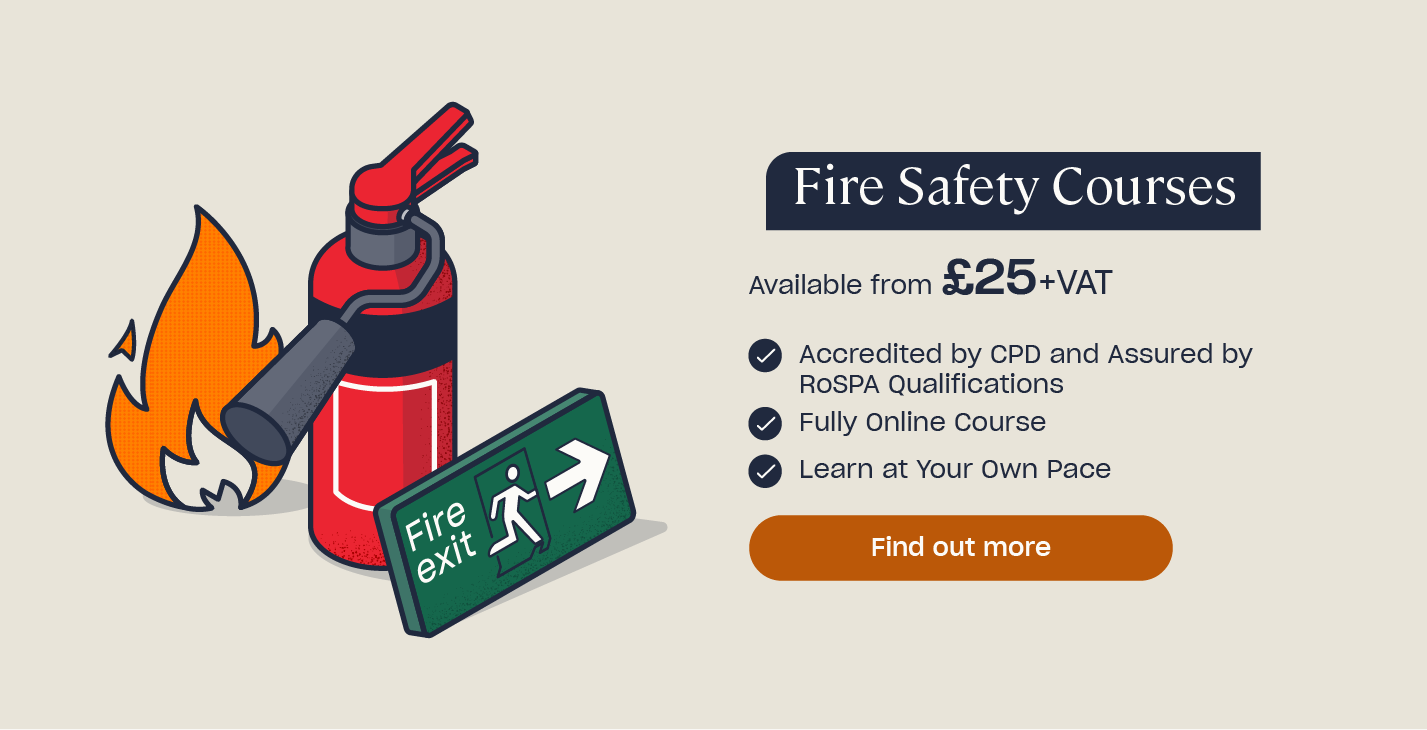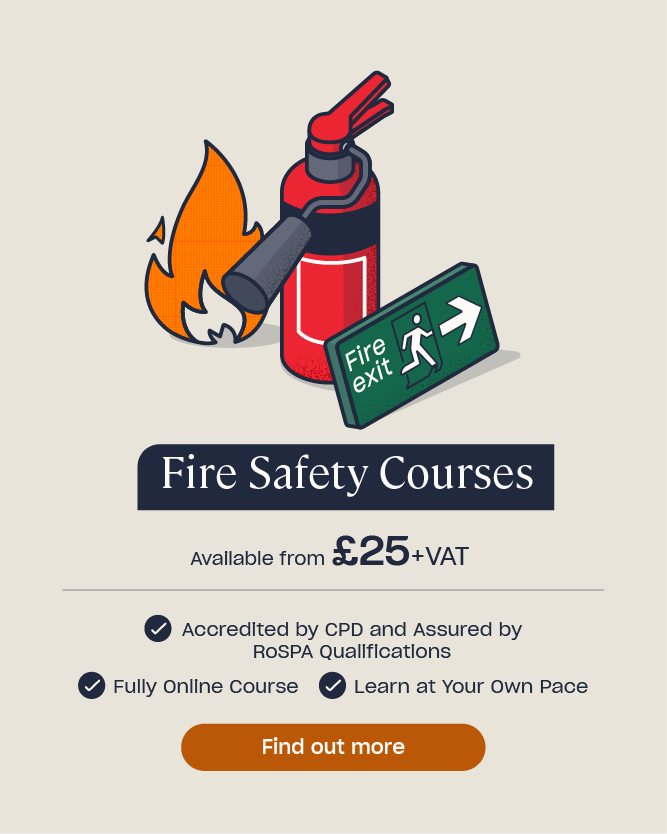BBQ Fire Safety: Regulations and Tips
With the weather getting warmer in the UK, barbeque season is fast approaching. BBQs are a popular choice for summer gatherings, whether that be with family in a private garden, or with friends in a public place. For some BBQ inspiration, you may want to check out our BBQ Checklist: Preparation and Safety Guide.
Although they are a popular choice, BBQs can pose many dangers if they aren’t managed and handled appropriately. BBQs are also prohibited in some places and so you must ensure you follow the rules.
This guide outlines the rules and regulations you must follow if having a BBQ in the UK. It explains the fire safety dangers you may face and provides some fire safety tips, so you can rest assured that your BBQ event is safe for everyone.
What are the Rules and Regulations for BBQs?
Before you start planning your BBQ, it’s important to consider whether there are any restrictions in place. You may need to hold your BBQ in a different location or make other adjustments to your plans. Many parts of the UK are classed as smoke control areas, meaning that smoke cannot be emitted from a chimney unless an authorised fuel is being burnt or exempt appliances are used. BBQs are exempt from this, and the government website clearly states that they can be used.
One law you need to consider and abide by regardless of where you have your BBQ relates to road safety. You must not have a BBQ near a main road as the smoke that drifts across the road could pose a visibility risk to drivers. You could be fined if you allow this to happen. Therefore, it’s important to plan and carefully consider where you are going to hold your BBQ.
BBQs on Private Property
If you’re having a BBQ in your garden or on your private property, there aren’t any laws preventing you from doing so when you please. However, the nuisance it can cause to neighbours, often from the smoke, can breach regulations in some circumstances. While the smoke is unlikely to be classed as a statutory nuisance, if you frequently have BBQs and they become an annoyance to people nearby, they may make a record of this and pass this on to their local council. You may then be visited by an Environmental Health Officer (EHO) to determine whether the complaint is a statutory nuisance, and you may be issued a notice to stop causing nuisance. However, this is in extreme circumstances only, and it’s more likely that your neighbour would talk to you first if your BBQ was causing them problems.
To avoid annoying your neighbours with the smoke from your BBQ, it’s best to let them know in advance that you are going to be having a BBQ. They may want to get their washing in first! You should also be considerate when setting up your BBQ by placing it where the wind blows smoke away from your neighbours’ gardens, and not directly next to it.
You are also strongly advised to not hold a BBQ on a balcony. While there is no specific legislation preventing you from doing so, it’s likely to be a clause within the terms of your lease. Even if this is not the case, having a BBQ on your balcony has the potential to be extremely dangerous. One danger is from the carbon monoxide fumes that may travel inside your apartment, which could be lethal.
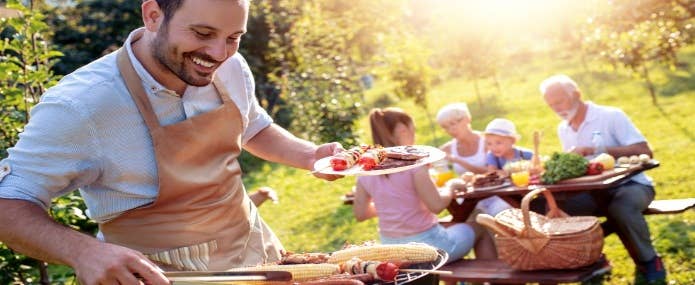
Public BBQ Laws
If you want to have a BBQ on public land, you must ensure that there are no regulations in place that prohibit this. There are rules in place that dictate how common land, towns and public greens are used. Often, the use of BBQs is included within this and a ban may be in place. This includes land that is owned by organisations such as the National Trust. The Countryside Code, for example, says not to have BBQs in open countryside unless there are signs saying you can. In addition, there are bylaws in place in some parts of the country, such as around London, that prohibit the lighting of BBQs in green public spaces.
These restrictions are in place due to concerns about fire safety hazards and the threat the BBQ can pose to the surrounding land and wildlife. Disposable BBQs are the main culprit of accidental grass fires which can have a devastating impact on the countryside. If a public area does not permit the lighting of BBQs you must follow this rule.
Green public spaces at other locations may permit BBQs in designated areas, provided they are managed appropriately to minimise the risk of harm to the public and the land. By following the fire safety tips explained later in this article, you can safely hold a BBQ in a public place, if permitted.
To avoid holding a BBQ in a public park illegally, it’s best to always check in advance whether BBQs are permitted there. If you’re uncertain, you should contact your local council for clarification.
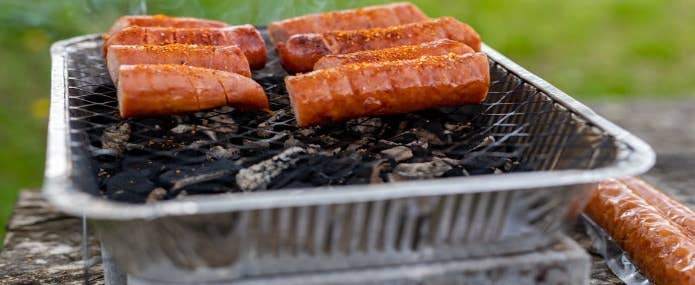
What are the Fire Dangers at BBQs?
Every year, fire and rescue services give warnings on the dangers of having a BBQ. Due to their very nature, BBQs pose many risks to health and safety. However, by taking the necessary measures, the risks can be controlled and reduced. You must recognise the potential dangers of having a BBQ, whether that be a disposable one or a gas or charcoal BBQ. If you are careless or don’t consider the potential dangers and act to reduce them, people could get seriously hurt.
Fires
One of the main fire dangers of BBQs is the risk of fires starting. Fires can get out of control very quickly and pose a serious risk to people, property and the environment. This can be easily caused if disposable BBQs are not disposed of correctly. Disposable BBQs should be left to cool for several hours before being disposed of. You should also pour water over it before putting it into a bin, to ensure the heat has been eliminated. This is important because many fires are started due to the heat from leftover disposable BBQs, rather than the flames themselves. The heat can easily set peat and dry moorland alight, causing catastrophic damage to the land, such as during the 2018 wildfires including on Saddleworth Moor.
Fires can also start if petrol, paraffin or other flammable liquids are used to try to start or accelerate a BBQ. To avoid this, you must never use flammable liquids on a BBQ and instead follow the manufacturers’ instructions that come with the BBQ.
Burns
BBQs can leave people with burns if precautions aren’t taken. This could be inflicted on the person controlling the BBQ, or someone who gets too close to it. BBQs get extremely hot and should not be touched when in use, or while they are cooling down afterwards. To avoid being burnt, you should avoid standing too close to the BBQ and encourage others to keep their distance. You should also use appropriate equipment, such as long-handled tongs, whilst cooking and needing to get closer to the BBQ.
Smoke
BBQs can give off fumes for hours after you’ve used them. Fumes include the poisonous gas carbon monoxide, which can be very hazardous to health if large quantities are inhaled. Carbon monoxide has no smell or taste, and so it’s unlikely you would notice straight away if you were breathing it in. The NHS lists the symptoms of carbon monoxide poisoning as:
- A tension-type headache.
- Dizziness.
- Feeling and being sick.
- Stomach pain.
- Tiredness and confusion.
- Difficulty breathing and shortness of breath.
These symptoms can be similar to that of the flu or food poisoning. However, if a person has carbon monoxide poisoning, they will not have a high temperature. If you suspect that someone has been exposed to low levels of carbon monoxide that have made them unwell, you should advise them to seek advice from their GP. If you think they have been exposed to high levels of carbon monoxide, you should ensure they go to A&E immediately.
This is why it is so important to set up your BBQ in a well-ventilated outside area. If you are camping, you must keep the BBQ outside and away from your tent even after it has stopped smouldering. It may still be letting off carbon monoxide fumes that can be deadly. By understanding the dangers and taking the precautions required, you can ensure that everyone is kept safe at your BBQ event.
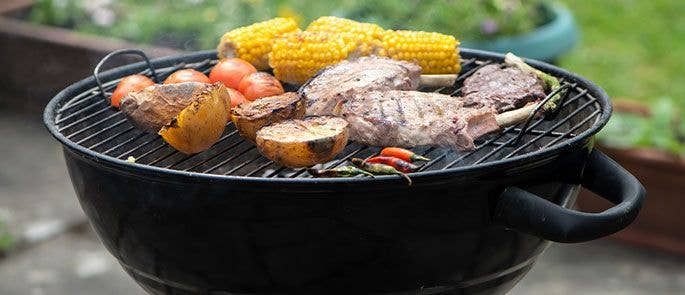
How Do I Extinguish a Fire?
A BBQ resulting in a fire is a worst-case scenario that you will hopefully not encounter. Nonetheless, it is important to understand how to extinguish a fire, particularly as they may spread very quickly. Someone must attend the BBQ at all times and be ready to take action if it gets out of control.
In the event of a fire, you are going to need to act quickly to prevent any damage or injuries. While flames are to be expected on a BBQ, they may become too large and difficult to control. This is why it is strongly recommended that you have a bucket of water or sand nearby to put on the BBQ and extinguish the flames if needed.
It’s unlikely that you’ll own a fire extinguisher, or have one to hand during a BBQ, but these can be used to extinguish a BBQ fire if there is a suitable type nearby. The type of fire extinguisher that is suitable will depend on the type of BBQ.
It is recommended that you use a dry powder fire extinguisher on gas BBQs, as these can be used on all Class C (gas) fires, as well as Class A (solid materials) and Class B (liquid) fires. Water extinguishers should only be used on fires caused by Class A materials, such as wood and paper. They can be used on both charcoal and disposable BBQs, though any fat from meat may spit when sprayed. As an alternative, where oils and fats are involved, wet chemical extinguishers can be used, as these manage Class F (oils and fats) fires such as fats from BBQ meats.
If you are going to use a fire extinguisher on a BBQ, you must ensure that it is the right type. It’s also advised that only people who have received some training in using extinguishers do so, because the techniques for using them safely and effectively can vary.
BBQ Fire Safety Tips
To help you to ensure your BBQ is managed safely and the risk of fire is reduced, we’ve put together a series of fire safety tips. The first list of precautions apply to all types of BBQ. None of these are intended to spoil your fun; following this guidance will help keep everyone, and the surrounding area, safe from fire.
You should:
- Never leave your BBQ unattended. Once your BBQ has been lit, a responsible adult must keep watch at all times.
- Keep children and pets away from the BBQ.
- Ensure games aren’t played near to the BBQ.
- Never place a BBQ inside or on a balcony. BBQs produce carbon monoxide, a gas which is poisonous and in high concentrations can cause fatalities. If camping, you must never put the BBQ inside, or close to the entrance of, your tent.
- Ensure your BBQ is positioned away from any trees, fences or anything else that could be flammable.
- Ensure there is adequate clear space around your barbecue to reduce the risk of fires spreading.
- Always have a bucket of water or sand nearby. This should be there as a precaution in case of emergencies to put out the BBQ and any fires that may have ignited.
- Ensure that the BBQ has cooled completely before touching or moving it. Never put hot embers into your bin.
In addition to the guidance above, you should also follow the fire safety guidance below for each specific type of BBQ.
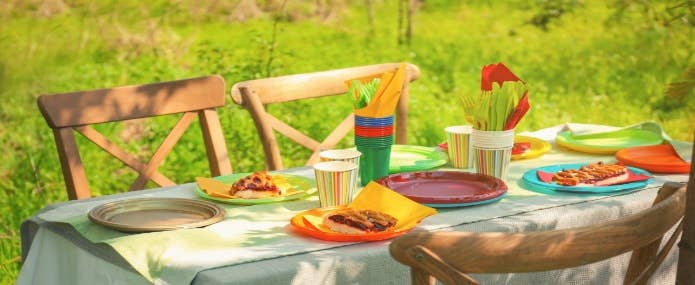
Gas Barbeques
If using a gas BBQ, you must:
- Ensure the BBQ is in a good working condition and do not use it if it’s faulty.
- Before you change the gas cylinder, always ensure the gas tap is fully turned off. Change the cylinder outdoors to ensure there is good ventilation.
- Always ensure the gas tap is turned off when the BBQ is not in use.
- After using the BBQ, firstly switch off the gas cylinder, and then turn it off at the main control to ensure any remaining gas has been used up.
Charcoal Barbeques
If using a charcoal BBQ, you must:
- Ensure the BBQ is in a good working condition and do not use it if it’s faulty.
- Only use enough charcoal to cover the base of the BBQ to a depth of roughly 2 inches.
- Only use recognised fire lighters and a small quantity of starter fuel on cold coals. You must never use petrol or paraffin to try to light a charcoal BBQ, or to accelerate it.
- Once you have finished using the BBQ, wait until the ashes have cooled completely and only then dispose of them in your wheelie bin.
Disposable Barbeques
If using a disposable BBQ, you must:
- Never place it directly on grass or a wooden surface. Instead, raise the BBQ on bricks or concrete and ensure that this surface is flat.
- Ensure that it is completely cold before disposing of it responsibly. You may have to wait several hours for it to cool, after which you should pour water over it to ensure it’s definitely out. As explained, the heat from discarded BBQs is often the cause of moorland fires, not the flames.
- Once it can be disposed of safely, put it into your wheelie bin or general waste, or a public bin.
You should now understand what you need to do to ensure your BBQ is managed safely. By following our fire safety tips, you can rest assured that your BBQ event will be free from any accidents, without spoiling any of the fun!
Further Resources:
- Fire Safety Training
- BBQ Checklist: Preparation and Safety Guide
- Burning Rubbish: What are the Rules and Regulations?


